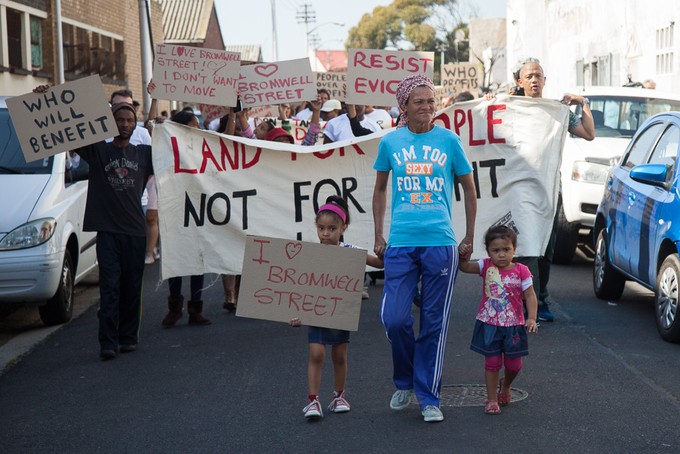Bromwell Street case could set precedent for city housing
Residents take City of Cape Town to court
If successful, the case brought by the residents of Bromwell Street against the City of Cape Town will provide a solid foundation for other vulnerable communities to demand and obtain emergency housing.
The Bromwell Street residents in Woodstock have faced eviction three times this year and are now asking for direct intervention from the City. Ndifuna Ukwazi Law Centre, acting on behalf of the Bromwell community, filed an urgent application in the Western Cape High Court on 20 September 2016. The application consists of two separate parts.
In the first part of their application, the residents seek an order suspending the execution of the eviction orders against them. This part relates to the property developer who purchased the land, Woodstock Hub.
This application is to be heard on Friday 23 September.
If it fails, the residents will be evicted from the Woodstock property in five days.
In the second part of their application, the residents seek an order declaring, among other things, that the City has a constitutional obligation to provide them with temporary emergency housing within three months of the court order being granted.
The residents argue that this obligation arises from the fact that they would be rendered homeless by the eviction. They say the City of Cape Town is required to provide the temporary accommodation in a location as near as possible to Bromwell Street.
At first the eviction order was to be executed on 9 September 2016, to allow the residents to find alternative accommodation. After unsuccessful attempts to obtain alternative accommodation, the residents asked the City for assistance.
The court papers filed by the residents detail their attempts to engage the City, including informing the City that the community would face homelessness if evicted. There appeared to be a brief moment of success when Mayor Patricia De Lille undertook to help and said she would look into alternative temporary accommodation. However, De Lille also stated that the City of Cape Town did not have an obligation to provide temporary emergency accommodation.
The City did in fact help to delay the execution of the eviction order from 9 September to 26 September, but, say the residents, no further help was given.
The residents argue that the City has obligations under section 26 of the Constitution and in terms of the Emergency Housing Programme. The Emergency Housing Programme regulates the provision of emergency temporary accommodation by municipalities and requires that a municipality provide housing in situations such as natural disasters and to those who would be rendered homeless as a result of eviction.
Of relevance is a previous decision from the Constitutional Court in the Blue Moonlight case in 2011. Though the case concerned the City of Johannesburg, the circumstances are similar, in that a community would have been rendered homeless if an eviction order against them was executed. The Constitutional Court held that the City of Johannesburg had an obligation to provide temporary emergency housing to the residents who were going to be evicted by private property owners. The court ordered that the City of Johannesburg had to provide temporary accommodation in a location as near as possible to the area where the property was situated.
© 2016 GroundUp. 
This article is licensed under a Creative Commons Attribution-NoDerivatives 4.0 International License.
You may republish this article, so long as you credit the authors and GroundUp, and do not change the text. Please include a link back to the original article.



